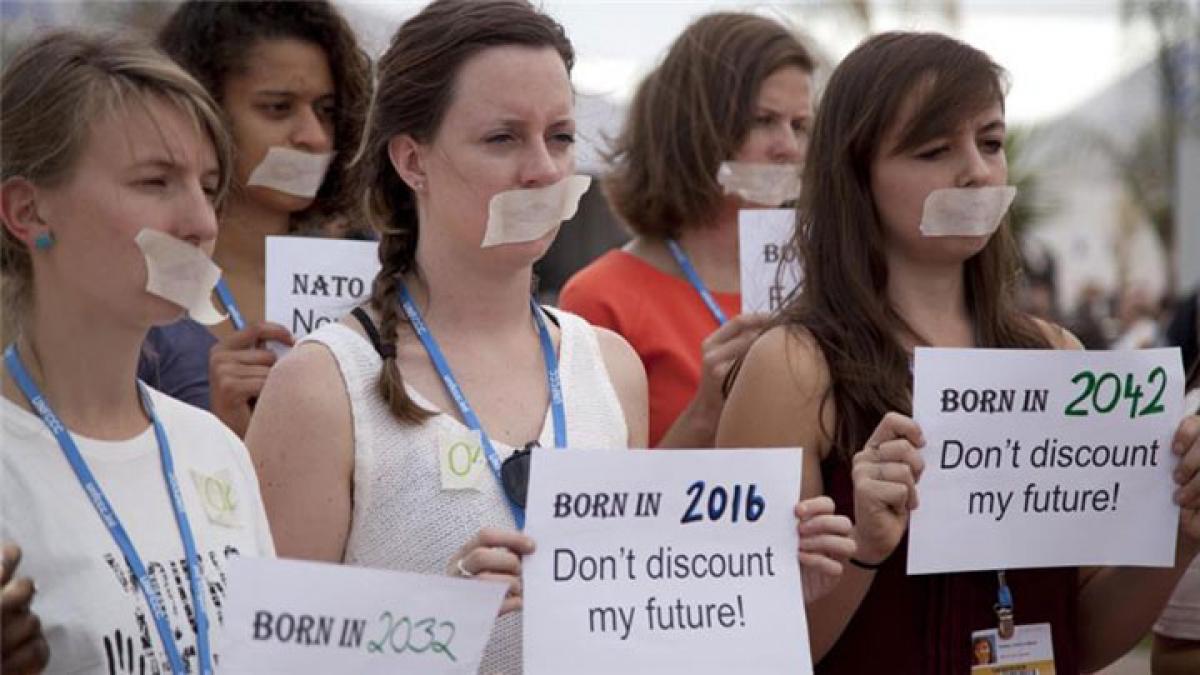Live
- Philippines orders full evacuation amid possible volcanic re-eruption
- Government Prioritizes Welfare of the Poor, says Dola Sri Bala Veeranjaneyaswamy
- Two Russian oil tankers with 29 on board damaged due to bad weather
- Telangana's Traditions Will Be Protected, Village by Village : BRS Leader MLC K. Kavitha
- Uganda to relocate 5,000 households from landslide-prone areas in eastern region
- Harish Rao Criticizes CM Revanth Reddy: "His Time is Over"
- Vijay Sethupathi Hails 'Vidudala-2' as a Theatrical Game-Changer
- Sahaj Yog: A Path to Inner Transformation and Harmony City takes giant strides
- Allu Arjun meets his uncle Nagababu at his residence
- J&K L-G felicitates Langar organisations & NGOs for contribution during Amarnath Yatra
Just In

As the climate summit enters the second week of negotiations, it is unfortunately becoming clearer that world community will have to focus more on \'ducking the solutions\'.
The consultations, which started on Sunday, are seen by many as simply the exercise in buying time. Most of the questions posed by the facilitators have either been responded to in earlier negotiations or clearly spelled out by the Intergovernmental Panel on Climate Change (IPCC)
.jpg) As the climate summit enters the second week of negotiations, it is unfortunately becoming clearer that world community will have to focus more on 'ducking the solutions'. Keeping on the annual performance of wordy diplomacy and harping with two decade old tunes of legally binding targets, conditions of technology transfer, finances and pointing fingers is not helping to stop the onslaught of climate change.
As the climate summit enters the second week of negotiations, it is unfortunately becoming clearer that world community will have to focus more on 'ducking the solutions'. Keeping on the annual performance of wordy diplomacy and harping with two decade old tunes of legally binding targets, conditions of technology transfer, finances and pointing fingers is not helping to stop the onslaught of climate change.
Negotiators from more than 150 countries are huddled in talks for the UN Climate summit to seal a legally-binding global deal that would make the world decarbonised by the end of this century. This is needed to keep the global temperature rising below a potentially disastrous two degrees Celsius compared to pre-industrial era.
The Obamian and Modian political speeches and even sincere discourses of Pope Francis and the Dalai Lama are proving to be just momentary inspiration. Finally, at a UN meeting, what happens is the insane repetition of the history. Though on time-scale the Paris negotiations are midway, substance-wise, they are farther behind . There is no sign of convergence in the approaches of rich and poor countries.
The 55-page negotiating document with which meeting started on November 30, has now been reduced, after one week of negotiations, to 43 pages after which it was handed over to the French presidency for final negotiations. The document is now titled 'draft Paris outcome' with all important issues yet to be negotiated.
They include financial commitment by the developed countries, technology transfer, capacity building, pre-2020 targets by developed countries, compensation on loss and damage, and legally binding targets post-2015. All of these are still 'bracketed' meaning left to the negotiations at the high-level, ministerial segment that began on Monday.
French Foreign Minister Laurent Fabius, on December 5, set the framework for the final week of negotiations. It included first two days of informal and formal consultations which will be led by the facilitators that include the ministers, to make progress and facilitate compromises. These consultations will be followed by high-level ministerial negotiations.
The consultations, which started on Sunday, are seen by many as simply the exercise in buying time. Most of the questions posed by the facilitators have either been responded to in earlier negotiations or clearly spelled out by the Intergovernmental Panel on Climate Change (IPCC). While the negotiations continue without any deal in sight, the impacts related to climate change are continuing all over the world with increased frequency and intensity. Many times they appear to be giving a warning at the highest level.
The United Nations office for Disaster Risk reduction (UNISDR) stated last month that that 90 percent of major disasters in the last two decades have been caused by nearly 6,500 recorded floods, storms, heat waves, droughts and other weather-related events. India, with 288 such disasters, is among the top five countries in the world that have been affected most, more than countries like the Philippines and Indonesia.
Since the first Climate Change Conference (COP-1) in 1995, nearly 6,00,000 lives have been lost and 4.1 billion people have been affected, left homeless or in need of emergency assistance as a result of weather-related disasters. The resulting economic losses are close to $2 trillion. Swiss Re, a main insurance company, says only a small part of this has been insured in the developing countries.
Living with disasters and adapting to sufferings has become the new norm side-by-side with old norms of negotiating the same issues at annual UN climate meetings. 'Ducking the solutions' is certainly another new norm.
What more, such new norms are now helping the poor to weather future storms through sustainable living. As for future generations, they too have learned to 'duck' the solutions. A new generation in Bangladesh, with new norms of entrepreneurship, has arrived, thanks to the archaic way of global climate negotiations.
By Rajendra Shende

© 2024 Hyderabad Media House Limited/The Hans India. All rights reserved. Powered by hocalwire.com







